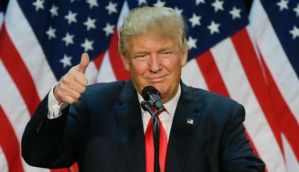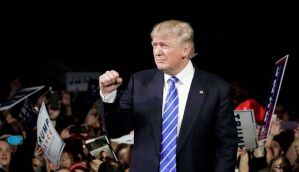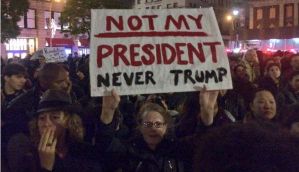
"Elections", Abraham Lincoln affirmed, "belong to the people. It's their decision. If they decide to turn their back on the fire and burn their behinds, then they will just have to sit on their blisters."
Americans have faced the fire and are now paying for their decision with blisters. But voting is one thing; running a democracy is another.
Elections, at their best, do not reflect the virtues of democracy. Rather, they show us that citizens are predisposed towards accepting or rejecting candidates on the basis of a behavioural psychology.
Fading public spirit
For months, the candidates for the American presidency have pushed politics in the country into a polarising game of "us" and "them". But in spite of all its public signs and events, what has been missing terribly is the public spiritedness and the republican virtue.
Also read - The US election won't be rigged - but the system has to be fixed
Let us not forget that for many of the Founding Fathers of the American republicanism, elections were not to be measured in terms of self-interests and personal ambitions, but in terms of virtue and excellence applied to American society as a whole.
As such, American republicanism was based both in theory and in practice on the idea of civic virtue and on the very simple truth that citizens are capable of governing themselves. Perhaps because of this public spirit, many founding republicans considered civic virtue to be the central matrix for happiness and self-government.
As John Adams once said: "Virtue and simplicity are indispensably necessary in a Republic among all orders and Degrees of Men."
To a great extent, this was true of the American Revolution, which helped promote the cultivation of public-spiritedness and republican virtue. But soon America would become what Adams called in a letter to Mercy Warren: "A Spectacle of Contempt and Derision to the foolish and wicked, and of Grief and shame to the wise among Mankind, and all this in the Space of few years."
Decline of virtue
The awareness of the decline of republican values and the lack of citizen virtue in different segments of American society led Adams to arrive at the conclusion that love of the private interest had become stronger than love of the common good.
Surprisingly, what Adams saw as the failure of the republican virtue in the newly freed colonies is once again the crux of the problem with the recent elections in America.
What this election in the US has showed us is that democracy is a fragile social and historical experience. Nevertheless, modern representative democracy and the entire voting process are also ways of taming the primordial prejudices of citizens that increase violence and erase the political from the public domain.
Modern democracy has always been aware of its inner evil and therefore has tried to dissimulate it. As such, it deceives everyone at all times, especially at the times of the elections.
'Trumpization of politics'
What we can call the "Trumpization of politics" in the American elections showed us, once again, that a politician can humiliate and degrade an assemblage of people in the most terrible way, by showing them their lack of civic virtue, and that they will still love him.
This brings us to the question of crowds in democracies and the need to follow rulers. It goes without saying that the ideas of "servitude" and "submission to power" are not only substantial elements of tyrannies, but also of evident importance for the background of understanding this phenomenon of this "Trumpization of politics" in contemporary democracies.
It is a combination that makes the process of lying and dominating in democracies very different from other kinds of domination.
As Elias Canetti, who won a Nobel Prize for Literature, argues: "Man has a profound need to arrange and re-arrange in groups all the human beings he knows or can imagine; by dividing that loose, amorphous mass into two opposing groups he gives it a kind of density. He draws up these groups as though in battle array; he makes them exclusive and fills them with enmity for each other...At the root of the process lies the urge to form hostile packs, which, in the end, leads inevitably to actual war packs."
Crowd logic: Us vs them
Canetti is referring hereby at an us/them relationship, which can emerge out of the crowd logic. By bringing to the fore the antagonistic nature of political identities, turning into what the German political theorist Carl Schmitt called a friend-enemy relation, any form of servility to a crowd closes down automatically the possibility of common sense in a democratic order.
Strangely, the crowd is never ruled by itself, but it is guided and governed by a few. The main idea herewith is that crowds become habituated to modes of non-thinking and non-questioning even about the most simplistic and trivial commonplace issues. Being diverted by bread and circus, they lose their autonomy and creativity and become incapable of looking beyond the process of voting. The reason why such logic of bread and circus gets by without too much questioning is that it appears to fall in line with the idea of electoral democracy itself.
What the US elections have showed us is that it is possible to invite the masses to elect without necessarily turning the two ideals of freedom and democracy into a form of self-government.
The growth of republican vices of pomp, ambition, lies, commerce and factionalism in the elections have not necessarily emphasised the creative capabilities of voters as autonomous individuals who are well in control of their political destiny. However, democracy needs its citizen virtue to make people realise that aspirations for the future are more important than the needs of the present.
Stopping the contagion
No doubt, democracy was invented in history not just to flatter the crowds but to deepen the virtue of citizenship in practice. The republican virtue of citizenship was the guiding political philosophy of the American Founding Fathers. For them it was more than a race in the elections. It was a way of life and an uncompromising commitment to civic virtue.
Let us not forget what Thomas Jefferson wrote to John Taylor on 28 May 1816: "We may say with truth and meaning, that governments are more or less republican as they have more or less of the element of popular election and control in their composition; and believing, as I do, that the mass of the citizens is the safest depository of their own rights, and especially, that the evils flowing from the duperies of the people, are less injurious than those from the egoism of their agents, I am a friend to that composition of government which has in it the most of this ingredient."
Looking at what the recent American elections have left for the public opinion around the world, it seems clearly the 'Trumpization of politics' has replaced the noble spirit of the American Founding Fathers and their positive passion for the public good and citizen virtue. Hopefully, this exercise of politics remains in the borders of America without extending its influence to other nations.
Edited by Aleesha Matharu
More in Catch - Both Trump and Clinton would see the US run like a corporation
Six types of ugly American, and Donald Trump is all of them
First published: 8 November 2016, 6:23 IST





![BJP's Kapil Mishra recreates Shankar Mahadevan’s ‘Breathless’ song to highlight Delhi pollution [WATCH] BJP's Kapil Mishra recreates Shankar Mahadevan’s ‘Breathless’ song to highlight Delhi pollution [WATCH]](https://images.catchnews.com/upload/2022/11/03/kapil-mishra_240884_300x172.png)

![Anupam Kher shares pictures of his toned body on 67th birthday [MUST SEE] Anupam Kher shares pictures of his toned body on 67th birthday [MUST SEE]](https://images.catchnews.com/upload/2022/03/07/Anupam_kher_231145_300x172.jpg)






